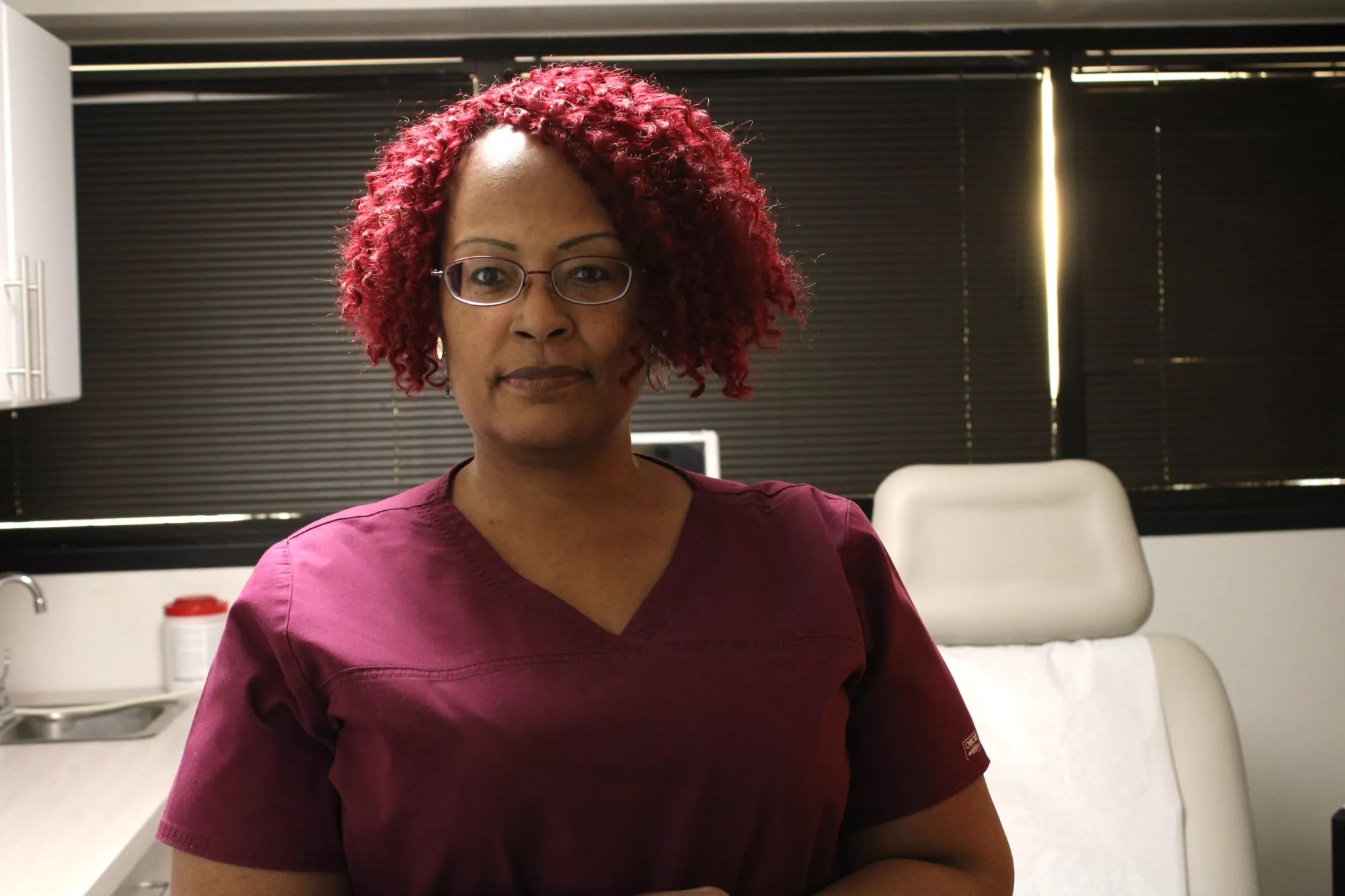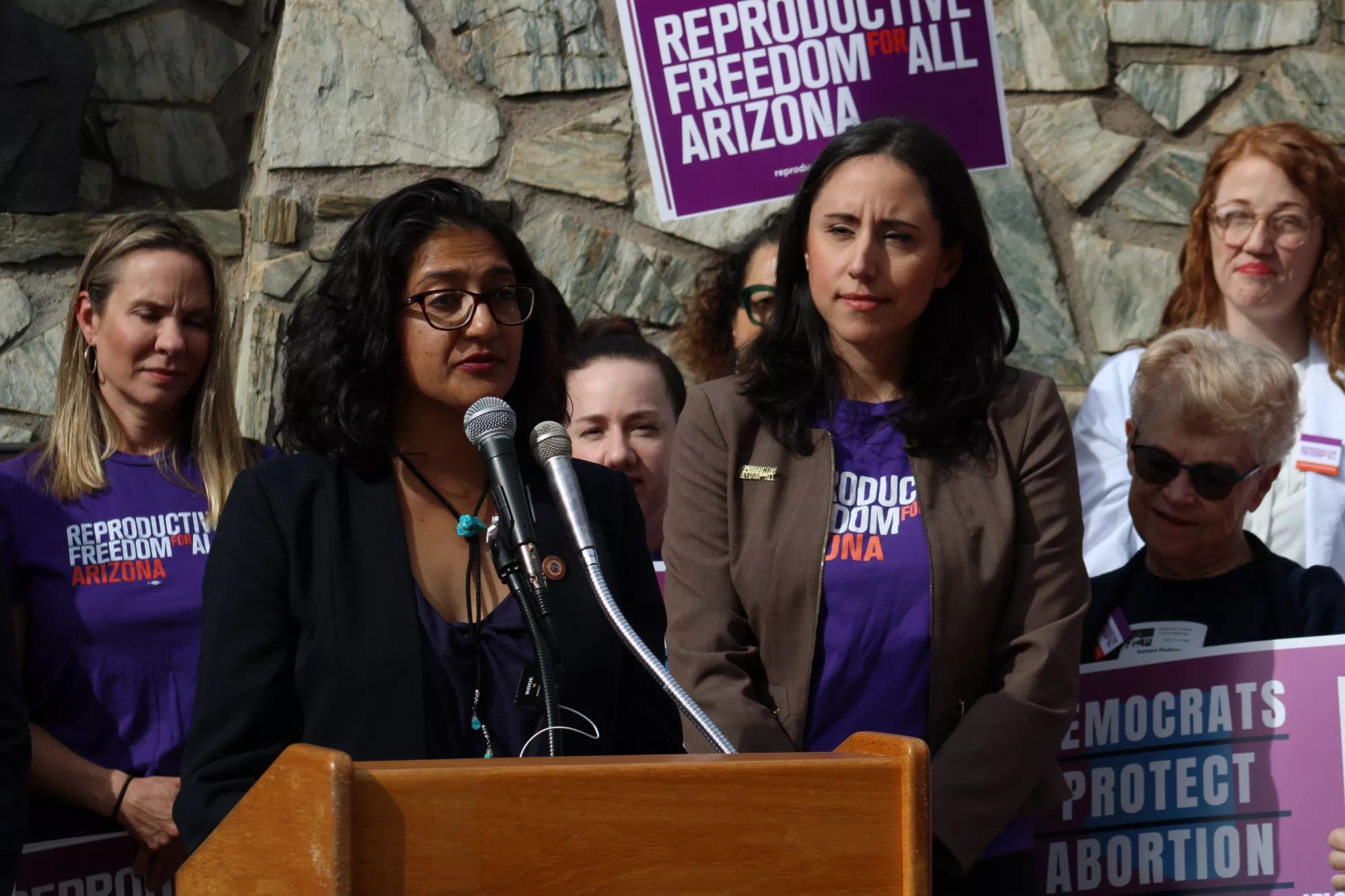
Ridofranz/Getty Images

Audio By Carbonatix
Late on a recent afternoon, Dr. DeShawn Taylor dropped into a black office chair. Letting out a large sigh, she wanted to steal a moment to rest. Her workday is over, but there is more to do.
Sporting purple scrubs and a matching bob, Taylor is always busy. She’s an OB-GYN who runs the Desert Star Institute for Family Planning in Phoenix, which offers abortions and other types of reproductive care. She’s also an activist. She advocated for Proposition 139, a ballot measure enshrining a right to abortion in the Arizona Constitution. And she then worked to convince voters to pass it.
Pass it they did. Reproductive rights are popular in Arizona, with 61% of voters opting to write them into the state constitution last fall. The ballot initiative was more popular among Arizonans than the winner of the Presidential election – the amendment gained 230,045 more votes in the state than Donald Trump.
That victory signaled the end of Arizona’s preexisting 15-week ban on abortion, which was finally invalidated by a judge earlier this month. Yet for Taylor and other abortion providers in Arizona, not much else has changed. They can perform abortions up to fetal viability – roughly 23 or 24 weeks – but a maze of other restrictions persists.
The 15-week ban was only one of roughly 40 anti-abortion statutes on the books in Arizona. The rest of those laws continue to do their intended purpose – make abortions harder to get. Abortion providers and activists have tried to get those laws repealed by the Arizona Legislature, but the going is tough. Anti-abortion Republicans hold majorities in both chambers.
As she sips a cup of coffee, Taylor opens her laptop to check on the effort. Her organization, the Arizona Proactive Reproductive Justice Alliance, is pushing a bill that would handle the problem in one fell swoop. Senate Bill 1553, sponsored by Democratic state Sen. Analise Ortiz, would repeal nearly every abortion restriction in the Arizona Revised Statutes.
The state’s 24-waiting period and telehealth ban, which require two in-person appointments before patients can get an abortion, would be gone. So would the prohibition on nurse practitioners providing medical abortions and reading required state-created scripts. Abortions would be allowed when the fetus has a genetic abnormality.
“Wait,” she says with surprise, scrolling slowly the legislature’s Bill Tracker page. “It got a hearing.”
That’s all it got. Ortiz’s bill never escaped committee, meaning it would never get an up-or-down vote in the Senate. If it had, the vote likely would have been down. The Republican-controlled legislature has yet to let a pro-abortion bill make it to the floor. Meanwhile, GOP lawmakers have pushed several bills that would restrict abortion further.
Democratic Gov. Katie Hobbs will stop those anti-abortion measures from becoming law, but abortion advocates such as Taylor will have to rely on court battles to whittle down the laws currently in effect. That process will be long. Prop. 139 forced a change – a big one, to be sure – but only one.
Every day, abortion providers jump through hoops and clear hurdles to give women the reproductive care the state constitution now says is their right.
“Anti-abortion sentiment,” said Taylor, “is baked into every part of our system.”

Dr. DeShawn Taylor has run Desert Star Institute for Family Planning in Phoenix since 2013.
Morgan Fischer
A web of restrictions
Taylor opened her clinic in 2013. She has never known an Arizona without restrictive abortion laws. That was the case prior to the fall of Roe v. Wade in 2022 and it’s the case now that the state’s 15-week ban has been overturned.
Even after Prop. 139, abortion in Arizona isn’t “as rosy of a picture as I think a lot of people want it to be,” said Dr. Misha Pangasa, an abortion provider and OB-GYN at Planned Parenthood Arizona. There are still “arbitrary obstacles that our patients have to jump through in order to get the abortion care that they need and have decided on.”
The Guttmacher Institute still identifies Arizona as a restrictive state on abortion due to the sheer number of restrictions still on the books. Many of those were passed “under the guise of patient safety,” said Dr. Gabrielle Goodrick, the medical director and founder of Camelback Family Planning. “But they do not improve patient safety. They’re burdensome and unnecessary.”
Goodrick, who founded her clinic in 1999, considers the 24-hour waiting period restriction “one of the worst.” Some patients may need the extra time to think through their decision, Pangasa said, but many abortion patients already have their minds made up. Many are already mothers with busy schedules.
Both appointments – the first to request an abortion, the second to actually have it – must be conducted in person because the state bans telemedicine for abortion. Many patients have a hard time getting one day off of work, much less two. Often, patients can’t get that second appointment until one to two weeks later. Depending on where you live in the Grand Canyon State, obtaining abortion care could mean hundreds of miles on the road and multiple motel stays.
There are nine abortion clinics in the state, according to Abortion Finder and Planned Parenthood: six in the Valley, two in Tucson and one in Flagstaff. If someone in Page wanted an abortion, the closest clinic would be Planned Parenthood’s Flagstaff location, which is two hours away. Round trips for both state-mandated appointments would require eight hours in the car. The Flagstaff clinic is equipped only to provide medication abortions – if the patient is past 12 weeks, a trip to the organization’s Glendale clinic would be required. Eight hours in the car has now become 16.
“This tactic to delay care just pushes people to have to wait longer (and) drive further,” Pangasa said.
Legislators have also increasingly restricted who can provide abortion care. Only physicians – not nurse practitioners or other medical staff – can provide surgical or medication abortions or read the state-created script that pushes abortion alternatives. At Taylor’s clinic, she has to sit down with every patient to read the script and hand over a pill. If a nurse practitioner or another staffer could do this instead, Taylor could see many more patients who need her attention.
OB-GYNs like Taylor have other obstacles to surmount. Abortion providers must have hospital admitting privileges within 30 miles of the clinic, but obtaining admitting privileges can be tough. Providers must prove to hospitals that a certain number of their patients will be admitted for care at the hospital. With few abortion-related complications these days, it can be difficult to reach that number.
“It’s like a Catch-22,” Goodrick said.
When she moved to Arizona, Taylor obtained admitting privileges by showing her caseload from California, when she had a full OB-GYN practice. She’s been able to renew each year by establishing an understanding with the local hospitals. She does not deliver babies as part of her clinic work, and in her 16 years of providing care in Arizona, she’s had perhaps five patients require hospitalization, she said.
“What happens down here in Phoenix is we have progressive faculty in hospitals that understand the assignment,” Taylor said. “They understand the political climate, and I have an agreement.”
Other restrictions, such as a requirement for parental consent, are so burdensome that Goodrick’s clinic has a pro-bono lawyer on call to help minors, many of whom are in the foster system. That attorney helps teens obtain a judicial bypass, which can be a scary and confusing process. One of Goodrick’s staffers is a notary public who can notarize parental permission slips, sparing teen patients a cumbersome errand.
All of these restrictions make providers’ and patients’ lives more difficult. They also “create this idea that somehow abortion providers aren’t safe,” Taylor said, which “puts up that barrier for patients to make them think that they’re doing something that’s dangerous.”
And if getting an abortion in Arizona is hard, knocking abortion restrictions off the books is even harder.

State Sen. Priya Sundareshan and abortion rights activist Athena Salman speak at a rally at the Arizona Capitol in March.
Morgan Fischer
Long road ahead
Theoretically, the process of invalidating Arizona’s abortion laws should be simple. The voters clearly supported fewer restrictions. The right to an abortion is written in black and white in the state constitution. Clearly, state lawmakers would vote to align Arizona laws with voters’ intent.
Nope.
In the first legislative session since Prop. 139 passed, state Democrats have introduced 10 bills to repeal anti-abortion restrictions. They aim to repeal the bans on telemedicine appointments, the mailing of abortion pills and abortion advertising, among others. These bills would also get rid of abortion reporting requirements, certain clinic regulations, the 24-hour waiting period and parental consent requirements.
They’ve gone nowhere. Republicans have a majority at the Capitol and can decide which bills get heard and which don’t. Only a few restriction-loosening bills have been assigned to committees. None have advanced to a floor vote. It’s “a continuation of the same-old-same-old partisan way that Republicans in the legislature have governed,” said Democratic state Sen. Priya Sundareshan.
Republican lawmakers have also pushed bills to further restrict abortion. Seven anti-abortion bills have been introduced this session. They would further restrict access to abortion pills and cut funding for abortion-providing health centers, provide parental access to medical records and promote anti-abortion material on state websites.
“This is a slap in the face of the voters,” former state lawmaker and current abortion rights activist Athena Salman said during a press conference at the Arizona Capitol on March 5.
Those bills are also doomed. No matter how much support they get in the legislature, Hobbs will veto them. But Hobbs can’t do anything about the anti-abortion laws that are already in place, and Democrats can’t do anything to knock them down in the legislature.
That’s not a uniquely Arizona problem. After Ohio passed its abortion rights amendment in November 2023, abortion restrictions remained on the books, explained Guttmacher Institute state policy associate Kimya Forouzan. “Oftentimes, the states that pass ballot initiatives, their state legislature are unfortunately just hostile to abortion,” Forouzan said.
That leaves the courts.
Now that the 15-week ban is dead, abortion rights activists are in “continuous conversations with partners and providers to determine what laws should be challenged next,” said ACLU Arizona spokesperson Amanda Mollindo in an email. As to the exact game plan to untie this complicated knot of anti-abortion restrictions, abortion rights advocates aren’t sure.
“There is this incremental web of restrictions that then creates this entire picture. And I don’t know how litigation untangles all of that,” Taylor said. “So it takes a lot of effort to figure out where the tentacles are going so we don’t miss something that we can repeal.”
Even if the restrictions do someday go away – even if Ortiz’s bill repealing them all is somehow resurrected and passed – abortion providers fear that lasting damage has been done to Arizona’s health care infrastructure.
Providing abortions is a hard way to make a living. Like Pangasa, many can afford to do so only on a part-time basis. “Most of us have other full-time jobs and are not able to dedicate our entire weeks or lives to care at Planned Parenthood,” Pangasa said. Mainstream health care has marginalized abortion care and it’s hard to build that system back.
“When you devalue the infrastructure of something, when it becomes legal, it doesn’t mean that it is going to be more accessible,” Pangasa said.
Taylor would love to see the day when abortion is more accessible, when a woman can enter a clinic seeking an abortion and obtain one without having to run a gauntlet of prerequisites. She doesn’t know if that will ever happen, but she’s determined to bring that day closer.
“Abortion was more popular than any other candidate during the November election, so we see that as a mandate,” she said. “We have clean bills that we can continue to introduce until the conditions are favorable for them to actually pass.”
Until that day arrives, she’ll continue to spend days on her feet scurrying between patients seeking reproductive care. When the last patient leaves, she’ll return to her office, pour another cup of coffee and open the laptop covered in abortion rights stickers.
“Abortion is Healthcare,” one reads.
When Arizona finally treats it that way, Taylor can rest.